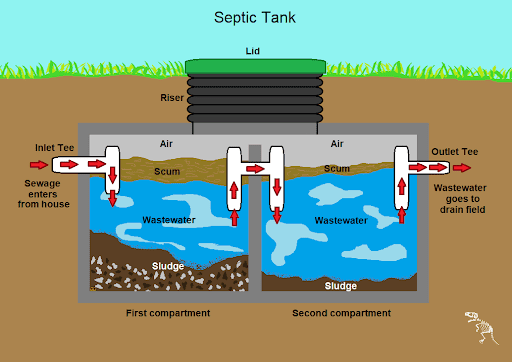Septic tanks are an essential part of many homes’ wastewater systems. They help to treat and dispose of household waste, but when they start to malfunction, it can cause serious problems. Some of the most common septic tank problems include clogged drain fields, tree root invasion, overuse, lack of maintenance, and flushing inappropriate materials down the drain. In this blog, we’ll explore these issues in more detail and discuss how to identify and address them to keep your septic services system running smoothly.
Table of Contents
Clogged Drain Field
The drain field is an essential component of the septic system that allows the treated wastewater to be absorbed into the soil. Over time, solids in the septic tank can build up and clog the drain field, preventing the wastewater from being absorbed. Signs of a clogged drain field include slow-draining sinks and toilets, standing water in the yard, and foul odors.
To address a clogged drain field, it’s important to have your septic tank pumped regularly. If your drain field clogs, you may need to have it replaced or repaired by a professional septic tank services.
Tree Root Invasion
Tree roots can cause serious damage to your septic system. They can grow into the pipes leading to the septic tank or even penetrate the tank itself. This can cause leaks, clogs, and damage to the tank or pipes. Signs of tree root invasion include slow draining sinks and toilets, foul odors, and standing water in the yard.
To address tree root invasion, it’s important to manage the trees and plants around your septic system. Avoid planting trees with aggressive root systems near your septic system, and have any existing trees trimmed regularly. If you suspect that tree roots have invaded your septic system, it’s best to call a professional septic tank service to assess the damage and recommend a course of action.
Overuse
Septic tanks become overwhelmed if they get overused. This is especially true if too much water use or if there are too many people living in the house. Signs of an overused septic system include slow-draining sinks and toilets, foul odors, and gurgling sounds coming from the drains.
To address an overused septic system, it’s important to conserve water and avoid overloading the system. This does by fixing leaks, using water-efficient appliances, and spreading out laundry and dishwasher use throughout the week.
Lack of Maintenance
Septic tanks require regular maintenance to keep them functioning properly. Failure to maintain the system can lead to backups, clogs, and other problems. Signs of a neglected septic system include foul odors, slow draining sinks and toilets, and standing water in the yard.
To address a lack of maintenance, it’s important to have your septic tank pumped regularly, typically every three to five years. It’s also important to avoid flushing inappropriate materials down the drain, such as grease, oil, paper towels, and feminine hygiene products.
Flushing Inappropriate Materials
Flushing non-biodegradable items down the drain can cause clogs and backups in your septic system. This includes items like paper towels, baby wipes, and feminine hygiene products. Similarly, pouring grease, oil, and other materials down the drain can cause clogs and damage the septic system.
To address flushing inappropriate materials, it’s important to be mindful of what you flush down the drain. Only flush toilet paper and human waste, and dispose of all other materials in the trash. Check Technorozen.com
Conclusion:
In conclusion, identifying and addressing common septic tank locating is crucial to maintaining a healthy and functional system. Clogged drain fields, tree root invasion, overuse, lack of maintenance, and flushing inappropriate materials down the drain are all issues that can cause serious damage to your septic system if left unaddressed. By regularly maintaining your system, conserving water, being mindful of what you flush down the drain, and seeking professional help when necessary, you can keep your septic system running smoothly and avoid costly repairs. Don’t wait until it’s too late – take action today to keep your septic system in good working order.

